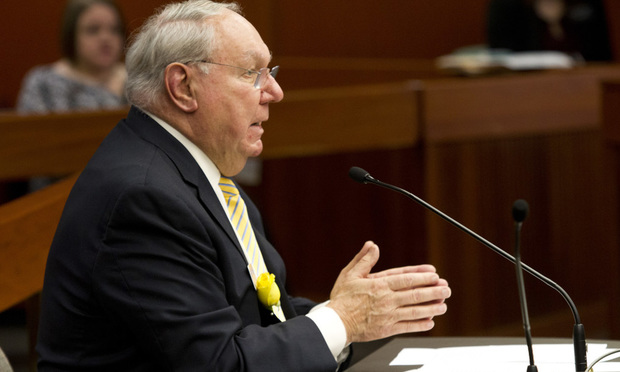Sovereign Immunity Bill Vetoed in 2016 Re-introduced in Legislature
Gov. Nathan Deal vetoed an identical bill that sailed through the Legislature in 2016 after the attorney general and Board of Regents raised objections.
January 17, 2018 at 09:40 AM
5 minute read

Less than two years after Gov. Nathan Deal vetoed legislation that would have stripped the state of its sovereign immunity protection in some cases, a nearly identical bill has been filed in the state House of Representatives.
Once again, the lead sponsor of the bill is House Judiciary Committee Chairman Wendell Willard, R-Sandy Springs, who introduced the prior legislation in response to a Georgia Supreme Court ruling barred a declaratory judgement action against the state.
Since that ruling, the court has continued to reinforce its interpretation of sovereign immunity as an unscalable barrier to virtually any claim against the state, including mandamus actions and petitions for injunctive relief.
The legislation introduced Thursday expands the law governing state tort claims by waiving sovereign immunity for any claim “seeking a declaratory judgment or injunctive relief against the state or any political subdivision,” although it continues to bar actions for money damages unless sovereign immunity was specifically waived.
House Bill 674's language is identical to that of the legislation that passed unanimously in the Senate and with only two “nays” in the House in 2016.
Deal's veto statement said the bill's “sweeping waiver of sovereign immunity would allow unprecedented judicial intervention into daily management decisions entrusted to the executive branch of government,” and posed “unforeseen ramifications that would impede government operations.” The Board of Regents and then-Attorney General Sam Olens also opposed the legislation, according to the statement.
A statement from current Attorney General Chris Carr's office said he is reviewing it the new legislation.
“The doctrine of sovereign immunity is a very important matter and one that Governor Deal's Court Reform Council, chaired by Attorney General Carr, formed a subcommittee to explore in depth,” Carr's office said via email.
Willard said he thought the new legislation provides a starting point to address sovereign immunity.
“The governor said he thought [the first bill] was too broad, so I said, 'Let's refile it, have some subcommittee hearings and let those people who expressed concerns with it come in, and hear what they have to say,'” Willard said.
The first draft filed in 2015 was in response to the Georgia Supreme Court's decision the year before in Georgia Department of Natural Resources v. Center for Sustainable Coast, 294 Ga. 593, Willard said. That unanimous decision overturned years of prior high court precedent by ruling that state agencies and officials were not subject to petitions seeking injunctive relief.
In those cases, the court ruled, aggrieved citizens were limited to filing suit against state officers “in their their individual capacities.”
The justices extended the immunity to suits for declaratory relief in 2016 in Olvera v. Univ. System of Ga. Board of Regents, 298 Ga. 425.
The Supreme Court nailed the doctrine down last year, ruling that suits challenging the constitutionality of a law through petitions for injunctive or declaratory judgement are barred unless specifically allowed by the Legislature.
In Lathrop v. Deal, 301 Ga. 408, Justice Keith Blackwell wrote that “the doctrine of sovereign immunity extends generally to suits against the state, its departments and agencies, and its officers in their official capacities for injunctive and declaratory relief from official acts that are alleged to be unconstitutional.”
Blackwell's opinion reiterated that suits against state officers in their individual capacities could still go forward, although they may not be as “convenient as a suit against the state itself.”
“That may be true,” he said, “but if so, that is simply a cost of sovereign immunity, albeit one that the General Assembly could eliminate by enacting a statutory waiver of sovereign immunity for suits like this one.”
Willard said the intervening years and rulings since Sustainable Coast have served to further convince him that legislative action is needed.
“We've had about three years where businesses and citizens can't seek injunctive relief,” he said. “I've heard numerous stories where people have issues, and can't have redress in the courts. We need to put back into law what we thought the law was before the Sustainable Coast case.”
State Sen. Josh McKoon, R-Columbus, who sponsored the earlier legislation in the Senate, said the legislation is still needed.
“I had a case a year or so ago where I sued a county commissioner over a violation of the state open meetings law and they asserted that, because the Open Meetings Act doesn't have an explicit exemption allowing them to be sued, they were immune,” McKoon said.
“It sounds kind of absurd, but if you read Sustainable Coast, that is a rational interpretation,” McKoon said. “I think we really need to address it.”
This content has been archived. It is available through our partners, LexisNexis® and Bloomberg Law.
To view this content, please continue to their sites.
Not a Lexis Subscriber?
Subscribe Now
Not a Bloomberg Law Subscriber?
Subscribe Now
NOT FOR REPRINT
© 2025 ALM Global, LLC, All Rights Reserved. Request academic re-use from www.copyright.com. All other uses, submit a request to [email protected]. For more information visit Asset & Logo Licensing.
You Might Like
View All
40% Contingency: A New Ruling Just Cost This Plaintiff Team $827K in Legal Fees
6 minute read
'David and Goliath' Dispute Between Software Developers Ends in $24M Settlement

Trending Stories
- 16-48. It’s Comp Time Again: How To Crush Your Comp Memo
- 2'Religious Discrimination'?: 4th Circuit Revives Challenge to Employer Vaccine Mandate
- 3Fight Over Amicus-Funding Disclosure Surfaces in Google Play Appeal
- 4The Power of Student Prior Knowledge in Legal Education
- 5Chicago Cubs' IP Claim to Continue Against Wrigley View Rooftop, Judge Rules
Who Got The Work
Michael G. Bongiorno, Andrew Scott Dulberg and Elizabeth E. Driscoll from Wilmer Cutler Pickering Hale and Dorr have stepped in to represent Symbotic Inc., an A.I.-enabled technology platform that focuses on increasing supply chain efficiency, and other defendants in a pending shareholder derivative lawsuit. The case, filed Oct. 2 in Massachusetts District Court by the Brown Law Firm on behalf of Stephen Austen, accuses certain officers and directors of misleading investors in regard to Symbotic's potential for margin growth by failing to disclose that the company was not equipped to timely deploy its systems or manage expenses through project delays. The case, assigned to U.S. District Judge Nathaniel M. Gorton, is 1:24-cv-12522, Austen v. Cohen et al.
Who Got The Work
Edmund Polubinski and Marie Killmond of Davis Polk & Wardwell have entered appearances for data platform software development company MongoDB and other defendants in a pending shareholder derivative lawsuit. The action, filed Oct. 7 in New York Southern District Court by the Brown Law Firm, accuses the company's directors and/or officers of falsely expressing confidence in the company’s restructuring of its sales incentive plan and downplaying the severity of decreases in its upfront commitments. The case is 1:24-cv-07594, Roy v. Ittycheria et al.
Who Got The Work
Amy O. Bruchs and Kurt F. Ellison of Michael Best & Friedrich have entered appearances for Epic Systems Corp. in a pending employment discrimination lawsuit. The suit was filed Sept. 7 in Wisconsin Western District Court by Levine Eisberner LLC and Siri & Glimstad on behalf of a project manager who claims that he was wrongfully terminated after applying for a religious exemption to the defendant's COVID-19 vaccine mandate. The case, assigned to U.S. Magistrate Judge Anita Marie Boor, is 3:24-cv-00630, Secker, Nathan v. Epic Systems Corporation.
Who Got The Work
David X. Sullivan, Thomas J. Finn and Gregory A. Hall from McCarter & English have entered appearances for Sunrun Installation Services in a pending civil rights lawsuit. The complaint was filed Sept. 4 in Connecticut District Court by attorney Robert M. Berke on behalf of former employee George Edward Steins, who was arrested and charged with employing an unregistered home improvement salesperson. The complaint alleges that had Sunrun informed the Connecticut Department of Consumer Protection that the plaintiff's employment had ended in 2017 and that he no longer held Sunrun's home improvement contractor license, he would not have been hit with charges, which were dismissed in May 2024. The case, assigned to U.S. District Judge Jeffrey A. Meyer, is 3:24-cv-01423, Steins v. Sunrun, Inc. et al.
Who Got The Work
Greenberg Traurig shareholder Joshua L. Raskin has entered an appearance for boohoo.com UK Ltd. in a pending patent infringement lawsuit. The suit, filed Sept. 3 in Texas Eastern District Court by Rozier Hardt McDonough on behalf of Alto Dynamics, asserts five patents related to an online shopping platform. The case, assigned to U.S. District Judge Rodney Gilstrap, is 2:24-cv-00719, Alto Dynamics, LLC v. boohoo.com UK Limited.
Featured Firms
Law Offices of Gary Martin Hays & Associates, P.C.
(470) 294-1674
Law Offices of Mark E. Salomone
(857) 444-6468
Smith & Hassler
(713) 739-1250







